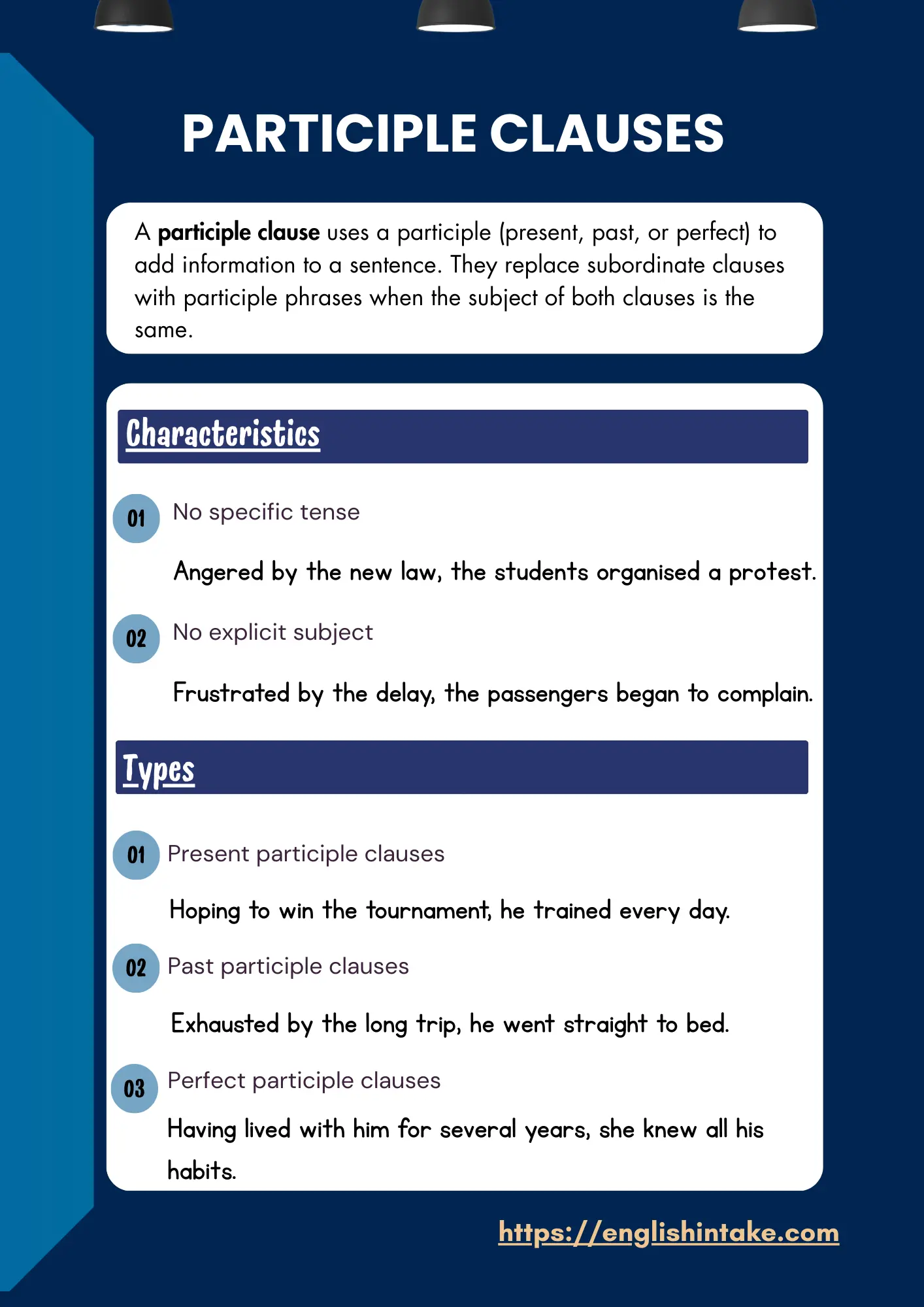1. What are participle clauses?
A participle clause is a type of reduced relative clause that uses a participle (present, past, or perfect) to add information to a sentence. They act like adverbs or adjectives to combine ideas concisely. They are most commonly found in written texts, especially in literary, academic, or journalistic writing. They replace subordinate clauses (like time, reason, or condition clauses) with participle phrases when the subject of both clauses is the same, making sentences concise and clear.
- Walking down the street, she found a golden necklace.
This sentence combines two actions: "She walked down the street" + "She found a golden necklace."
2. Characteristics of participle clauses
2.1. No specific tense
Participle clauses do not have a specific tense; it is determined by the main clause.
- Being a doctor, Maria knew how to handle the emergency.
- Facing economic challenges, the government introduced several reforms.
- Amid concerns over economic espionage, the government has enhanced counterintelligence operations.
2.2. No explicit subject
Participle clauses do not include their own subject because the subject is implicitly understood from the main clause.
The subject of the participle clause is always the same as the subject of the main clause.
● In response to the growing security threats from Russia, several European countries has increased their military budget to bolster national defence.
● Having lost his fortune, he fell into depression.
● Annoyed by the noise, she covered her ears.
● Mentored by his father, Khabib Nurmagomedov became an undefeated UFC Lightweight Champion.
3. Types of participle clauses

3.1. Present participle clauses
A gerund or present participle clause is a form of non-finite clause that uses verbs ending in -ing to describe actions that happen at the same time as the main clause, give reasons, show results, or add extra details to the main clause. They often replace phrases with words like because, while, or and.
● Feeling exhausted, she cancelled her meeting. (She cancelled her meeting because she was tired.)
● Not knowing what to do, she took a deep breath and tried to calm down. (Because she did not know what to do, she took a deep breath and tried to calm down.)
● Starting tomorrow, the café will close early. (The new closing time begins tomorrow.)
● The storm raged for hours, flooding the streets. (The storm caused the streets to flood.)
3.2. Past participle clauses
A past participle clause is a type of non-finite clause that uses verbs ending in -ed or irregular past participles (e.g., written, broken) to describe passive actions, give reasons, state conditions, or add details. They often replace passive voice phrases or conditional clauses with words like if or because.
● Stored properly, vegetables stay fresh longer. (If they are stored properly, vegetables stay fresh longer.)
● Shocked by the news, Maria called her friend. (Because she was shocked by the news, Maria called her friend.)
● Nurtured with honesty, love thrives. (If love is nurtured with honesty, it thrives.)
● Angered by the lack of a pay rise, the employees organised a protest to voice their concerns.
3.3. Perfect participle clauses
Perfect participle clauses use "having + past participle" (e.g., having finished, having been warned) to show an action completed before the main clause. They emphasise sequence and often replace phrases with after, because, or since.
● Having finished her homework, Lucy watched TV. (After she finished her homework, Lucy watched TV.)
● Having been warned about the storm, they stayed home. (Because they had been warned about the storm, they stayed home.)
● Having missed the train, he called a taxi. (After he missed the train, he called a taxi.)
● Having been divorced several times, he still believes in marriage. (Even though he had been divorced several times, he still believes in marriage.)
